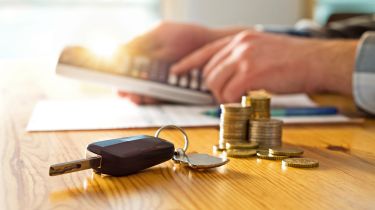10 tips to get cheap car finance
We explain the best ways to get a cheap finance deal on your next car

If you’re looking for a new or used car on finance, there are a few things to check to make sure you don’t spend more than necessary. Hire Purchase and Personal Contract Plans are the most popular way of funding a car, so we’ve tailored our tips to these methods of financing.
Our recommendations will help get the best deal, ensuring you save the most money while getting the car you want. If it’s a used car you’re after, also be sure to check out our guides to how to check if a car has outstanding finance and what is an HPI check.
It’s all about the APR
The APR figure shows the level of interest and other compulsory charges that are issued when borrowing money. The higher the rate, the more you’ll pay, though there’s a very big exception to that when large deposit contributions are available (you can often find these on new-car PCP and Hire Purchase deals) – as these finance discounts aren’t accounted for in the APR figure.
No matter the deal you had with your previous car, you should always review the market before shopping to set your expectations. Interest rates may be higher or lower than the last time you purchased a car, so doing a little homework will help you better identify the best deals.
 Free car finance calculator tool: compare used car finance quotes fast
Free car finance calculator tool: compare used car finance quotes fast
If purchasing new, most people choose a PCP scheme (Personal Contract Plan) as the majority of the time this offers a lower monthly payment. Make sure the dealer is clear on not only the APR rate but also any deposit contributions that are included. Remember that although a ‘£4000 deposit contribution’ sounds tempting, if it is paired with a higher interest rate then you may be no better off.
When purchasing a used car, PCP finance may still be an option, but it depends on the car’s age and mileage. For this reason, more used purchases are made on HP (Hire Purchase). There may be room for negotiation on the APR rate of a used car, so make sure you speak to the dealer and don’t just agree to a deal because it is within budget.
In either scenario it can be worth speaking to your bank or an independent finance specialist so you have a guide as to what rates of repayment are on offer.
Good credit ratings equals good finance deals.
Credit ratings identify how risky you will be to lend money to; lenders may still offer finance if your credit isn’t perfect, but they might want a higher deposit, or charge a higher APR. We’ve split our guide in three here depending on your rating.
Excellent - If you have a high credit score and never miss a payment, then lenders are most likely to offer their best rates. We suggest discussing what the lowest rates a dealer currently offers are, but remember to negotiate wherever possible for the best deal. The vehicle and any extras also form part of your overall cost, so be sure to factor this in.
Good - You may have had an issue years ago or missed occasional payments, but still have a good overall credit rating. Lenders are less likely to offer their headline finance rates if this is the car, but they will still want your business. Make sure your budget takes into account a slightly higher repayment rate on the car you want to buy.
Poor - If you’ve a poor credit rating, financing a new car may be more difficult, but it’s often not impossible. Firstly, if a dealer finances through a bank or finance company that you have a good relationship with then you are more likely to be considered and get accepted. Secondly, don’t sign up to any APR just to get a deal. Most reputable banks and finance companies won’t offer a deal that has an extortionate rate of interest as this hampers a customer’s ability to pay back. Be sure to check the interest isn’t so high that you are unable to pay back the total amount you’ve borrowed.
With deposits, size matters
Having a bigger deposit reduces the risk for a lender as they are lending you a lower proportion of the value of the car. If you are fortunate enough to have a big deposit or you have a large amount of equity in your trade-in, then banks see you as a safer option. Some finance deals require large deposits to achieve a particular offer, so if you have substantial savings, then look out for these as a way of reducing your monthly outgoings.
 Black box car finance: pay as you go car deals explained
Black box car finance: pay as you go car deals explained
Before you test drive a vehicle, make sure you can afford the deposit and subsequent repayments. It can be easy to see a monthly payment that is affordable and then find out that the deposit needed is much higher than you have budgeted, pushing the regular payment much higher than you wanted to pay.
Value the residuals
The value of your car at the end of the finance agreement matters, and some cars hold their value better than others. Choosing a car that is right for you, but will also have a strong resale value, can reduce your payments when using a PCP (Personal Contract Plan). The higher residual value means a higher proportion of the total amount is deferred, but remember you’ll pay interest on the whole amount – including any balloon payment.
Residual values are also worth remembering even if you are financing using HP (Hire Purchase). The more your car is worth when you've finished paying it off, the greater deposit you will have for your next car.

Don’t forget to haggle
Demand for new and used cars can ebb and flow, and so even when the market is busy and dealers are selling cars quickly, there can still be room to haggle. It can be as simple as asking whether the dealer is willing to offer a discount, or insisting on more money for your part exchange.
If the market is strong and cars are selling quickly then your part exchange may also be more desirable – remember, it isn’t a one way street when buying. The most important thing is to negotiate the payments, interest, and total amount, to figures you are comfortable with.
Set realistic mileage limits if your deal includes them
If you are looking to purchase a vehicle using a method that has a guaranteed future value (GFV), then you will need to agree to a mileage limit. This is so finance companies can predict what the car will be worth at the end of your deal.
Make sure you remain realistic and don’t sign up to a very low mileage limit just to keep your payment down. Look back at old MOT certificates if you aren’t sure on how many miles you drive in a year. It is also important to allow yourself a buffer in your agreement; if you regularly drive 8,000 miles a year then sign up to a deal that gives a little more so you won’t have to worry if your mileage increases slightly.
If you do go over your agreed mileage you may have to pay an excess mileage fee. This can range from three to 30 pence, so if it’s the lower end of that spectrum, then going slightly over isn’t likely to cost you much at all; an extra 1,000 miles could add as little as £30 to your overall agreement.
The car makes a difference
Certain cars may make a difference to the terms of your finance agreement – particularly if they are rare or highly sought after. There are many specialist finance firms that deal with unusual or uncommon cars, or those that have been modified. Examples could be vehicles that have been converted for camping or wheelchair use, as well as supercars that mainstream finance companies may choose to not deal with as the risk profile is too high.
It is critical to shop around yourself for the best finance deal if you want a car like this. The dealer may have one company that they use for specialised vehicles, but without knowing if they are offering you a competitive deal you may sign up to a more expensive deal than you could have got by searching online.
Number of credit checks you’ve had in last 6 months
If you are planning to purchase a car you should be careful to not put yourself forward for too many full credit checks, especially for other large purchases.
Banks and finance companies may view this as risky – taking on several large finance agreements could, in theory, reduce your ability to make repayments. It is fine to use your credit card for purchases, but be sure not to commit to several large finance agreements just before searching for your next car.
If you are recovering from a bad credit profile, build up a score before getting a car
If you have previously struggled with poor credit it can be difficult to get accepted for car finance. A top tip is to build your credit score up as best as you can before trying to secure a competitive deal. Cars are usually the second most expensive purchase people make, so it is important to not get swept up in finding a car and then agreeing to whatever payments are offered – just because your credit isn’t perfect.
Be wary of optional extras, ‘the cost of a coffee a month’ quickly adds up
Remember that salespeople are trained to flog you everything they can. This can be helpful when they identify something that you really wanted, but an extra few pounds a month can add up. You should be careful to not become overwhelmed with extras, and end up paying more than you wanted.
Adding lots of options to a PCP agreement adds the full cost of the extra, but doesn’t necessarily raise the car’s residual value. This can increase the total amount you finance considerably.
Be strict with you budget limit, and be prepared to walk away
The best way to establish which finance deal offers you the best value is to get like-for-like quotes, with the same type of finance, deposit, contract length and mileage allowance.
The same car could cost £100 per month with a large deposit, long contract, and low mileage allowance, but jump to £400 per month with no deposit, a short contract and a high mileage allowance. You can only make true comparisons between cars or finance deals by getting quotes with matching contract terms.
It can be incredibly enticing to accept a deal, especially if you are buying used and have been looking for a particular colour or specification and missed out before. New buyers can face the same struggle when stock is low, but the dealer has the car you want. Add in a test drive and all of a sudden you are looking at a finance agreement with a pen in your hand.
It is important to have a few goals in mind, and stick to them. Instead of telling the dealer you are just looking around, make it clear that you aren’t sure exactly what you want but you know exactly how much you have to spend. You might find the perfect car at the first dealer or first online showroom so make sure you have your limit set from the beginning.
Check out our guides to should you lease or buy your next car, and car subscriptions.
Recommended

Suzuki’s new 10-year warranty is free – here’s how to get it
Most Popular
Tips & advice

Car dashboard warning lights: what does each symbol mean?

Electric car charging stations: public networks, charger types, apps and maps






